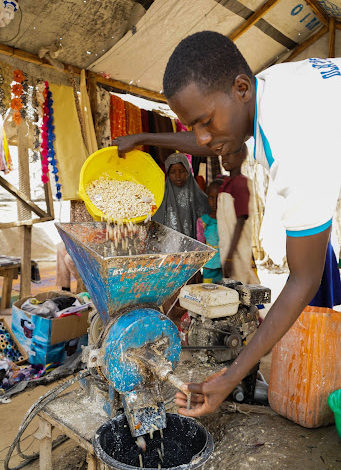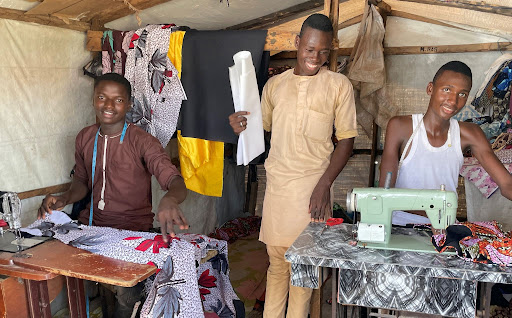
The maxim that “there is no medicine like hope and no tonic so powerful as an expectation for something better tomorrow,” aptly depicts the stories of many Internally Displaced Persons (IDP) in Northeast Nigeria.
Many IDPs, who have lost their most valuable assets in the decade-old Boko Haram insurgency, are still rebuilding their lives and focusing on a brighter future.
The 12 years of attacks by Boko Haram and the attendant military counteractions has caused the displacement of millions of persons – mostly women and children – from their original abodes into refugees or IDP camps.
From the midst of abundance where they choose what they eat or drink from the blessings of their toil, a generation of hardworking men and women are now no better than beggars in camps and streets of Maiduguri. Many have given up on hope, as despondency now defines their state of being.
However, despite all the crippling setbacks, there are still many IDPs and victims of the insurgency, who still cling to the weathering string of hope and expectations for a better tomorrow.
Resilience and hope
IDPs like Alhaji Bukar, Mohammed, and Sadiq have told their stories of pains and anguish in their experiences of the conflict, yet they are spurred to remain hopeful by a growing resolve to never give up on themselves.
Alhaji Bukar said he was 19 at the time he arrived in Maiduguri six years ago. He had nothing except the dishevelled clothing he had on him when he joined others to flee an attack on their country home, Baga.
Baga is about 200km away from Maiduguri. But distance meant nothing to Bukar and his family when he fled on foot as the attackers came shooting. They sauntered in severe heat and weather conditions, with little food and water.
Without food or water to drink, Bukar said they hoofed it to the IDPs camps in Maiduguri.
He eventually found a mini home at the Teacher’s Village Camp, a state government established IDP camp where food and other related housing needs were provided for by International Organisation for Migration (IOM) and the State Emergency Management Agency (SEMA).
Life was difficult in camp but waiting for handouts from government or humanitarian workers makes it even more miserable. So, unyielding IDPs like Bukar had to devise means of survival. Now 25, Abubakar said he had to pick up a menial job as an apprentice at the shop of a grinding machine operator to support his family.
He makes between N20 and N50 per order for grinding grains and pulses, such as corn, beans or wheat. From such meagre earnings, he would save something that usually goes a long way to assist him.
His tenacity at working to save had eventually yielded results when he bought his grinding machine. “Each time I power it up to fulfil orders from customers, I usually wear a smile, that now I am a master of my business,” he said.

He said his customers also come from around the Teacher’s Village IDPs camp to take. “I am grateful to God that today I have something of my own, that I can help myself and even my family,” Bukar said.
Bukar may have restarted his life in a small way but holds bigger dreams for the future. Already, he is using his improved income to diversify his business. He has added the sales of sewing materials, such as thread and zippers to his fellow IDPs.
IDPs today represent a class of people that must depend on government and humanitarian organisations to survive. In worse cases, they are the new set of beggars that have besieged the streets of Maiduguri.
But in Bukar’s thinking, relying solely on public handouts only serves short term needs; that in the long term, it exacerbates one’s suffering. “We have to get up on our feet and fight for ourselves to earn our income,” said Bukar.
The 25-year-old relentless entrepreneur is not the only one that believes that one is better off as a self-reliant IDP.
Never say never spirit
Two young tailors, Abubakar Rabiu and Mohammed Rabiu whose shop is just opposite Abubakar’s, picked the trade they were known for back home in Baga.
Abubakar and Mohammed Rabiu, who are brothers of the same parents, are into sewing different fabrics and beautiful designs for their fellow IDPs.
Nigerian women and men love coloured costumes “made from Ankara, a particular fabric with Africa-inspired designs.” Abubakar 20, and Mohammed 22, make brisk income sewing at an affordable rate to the camp’s residents. The two brothers said the last time they saw their home was in 2019.
Just like others, they too went to Teacher’s Village Camp empty-handed but already learnt skills – tailoring. “I am pleased that the money we spent to learn this job wasn’t a waste,” said Mohammed. “We are benefiting from the investment now and we are getting a source of income for the family.”
Though they hoped for the day they would finally return to Baga, the duo said what preoccupied their minds, for now, is working hard to make money and take care of their family.
*The resource for this report was a publication shared by the UNOCHA.
Support Our Journalism
There are millions of ordinary people affected by conflict in Africa whose stories are missing in the mainstream media. HumAngle is determined to tell those challenging and under-reported stories, hoping that the people impacted by these conflicts will find the safety and security they deserve.
To ensure that we continue to provide public service coverage, we have a small favour to ask you. We want you to be part of our journalistic endeavour by contributing a token to us.
Your donation will further promote a robust, free, and independent media.
Donate HereStay Closer To The Stories That Matter




